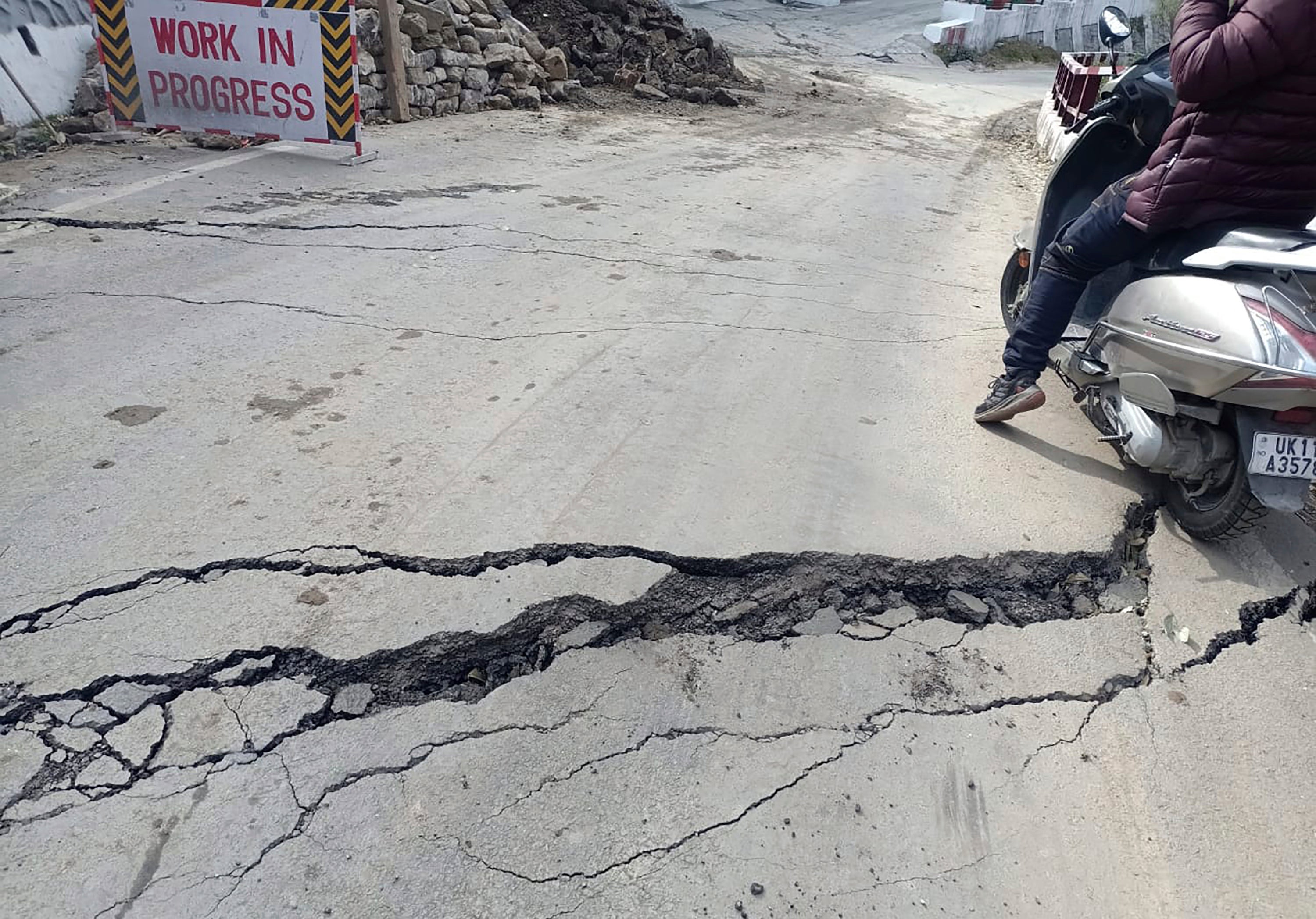Sinking land forces hundreds to leave Indian temple town
Authorities in an Indian Himalayan town have stopped construction activities and started moving hundreds of people to temporary shelters after a temple collapsed and cracks appeared in over 600 houses because of sinking of land

Your support helps us to tell the story
From reproductive rights to climate change to Big Tech, The Independent is on the ground when the story is developing. Whether it's investigating the financials of Elon Musk's pro-Trump PAC or producing our latest documentary, 'The A Word', which shines a light on the American women fighting for reproductive rights, we know how important it is to parse out the facts from the messaging.
At such a critical moment in US history, we need reporters on the ground. Your donation allows us to keep sending journalists to speak to both sides of the story.
The Independent is trusted by Americans across the entire political spectrum. And unlike many other quality news outlets, we choose not to lock Americans out of our reporting and analysis with paywalls. We believe quality journalism should be available to everyone, paid for by those who can afford it.
Your support makes all the difference.Authorities in an Indian Himalayan town have stopped construction activities and started moving hundreds of people to temporary shelters after a temple collapsed and cracks appeared in over 600 houses because of sinking of land, officials said Saturday.
Residents of Joshimath town in Uttarakhand state say they started noticing cracks in houses, especially after 2021 floods in the region. No injury was reported in the temple collapse late Friday and those living nearby had vacated the area a day earlier.
Himanshu Khurana, a district administrator, said more than 60 families have been moved to government relief camps. The number is likely to go up to 600 families, media reports said.
Television images also showed cracks in roads, hampering the movement of vehicles.
Ranjit Singh, a top state disaster management official, said the immediate cause of the cracks “seems to be the faulty drainage system, which has resulted in water seepage under the houses that has led to their sinking.”
The government will pay 4,000 rupees ($50) per month for six months to those rendered homeless in Joshimath, a temple town of around 25,000 people that sits at an altitude of 1,890 meters (6,200 feet) and falls on key Hindu pilgrim as well as trekking circuits, Khurana said.
Tens of thousands of devotees heading for Badrinath and Him Kund Sahib, key Hindu and Sikh pilgrimage sites, pass through Joshimath, 490 kilometers (305 miles) northeast of New Delhi. The huge flow of pilgrims and tourists saw the town expanding exponentially over the years with the massive construction of buildings and roadways, which some experts have linked to land subsidence.
The construction activities that were temporarily halted include the Chardham all-weather road — a flagship federal government enterprise to connect various Hindu pilgrimage sites, a project to set up trolleys pulled by ropes to carry pilgrims and tourists in nearby Auli, and hydropower stations.
The region witnessed a devastating cloudburst — an extreme rainfall in a short time — that resulted in the death of hundreds in 2013 as well as severe flooding in 2021. Experts say fast shrinking glaciers, in part due to climate change, is also another reason the region is hit by repeated disasters.
“Between 2015 and mid-2021, at least 7,750 extreme rainfall and cloudburst instances have been noted in Uttarakhand. Such instances are detrimental to Joshimath as they may increase the number of impacted buildings, eventually exacerbating the vulnerability of the locals,” said Kavita Upadhyay, a water-policy expert who is currently a research associate in the Oslo Metropolitan University’s Riverine Rights project.
Upadhyay, who is from Uttarakhand and lives in the region, said unabated large-scale infrastructure projects as well as uncontrolled tourist inflow have also contributed to land sinking.
“The slopes of Joshimath are formed from landslide debris. This means that there’s a limit to which the town can be burdened by buildings or disturbed by activities such as the construction of big infrastructure projects like dams and roads.”
A study by the Uttarakhand State Disaster Management Authority has warned that construction by removing boulders and blasting the hillside would lead to severe environmental damage.
In May last year, Meera Rawat, a resident, was startled while cooking in the kitchen when she heard a gurgling sound of water flowing underneath the floor.
“That day, I realized something bad was going to happen in our town of Joshimath. In September, I saw a small crack in the floor. In December, it widened, and we vacated the house,” Meera said.
___
Associated Press writer Sibi Arasu in Bengaluru, India, contributed to this report.
___
Associated Press climate and environmental coverage receives support from several private foundations. See more about AP’s climate initiative here. The AP is solely responsible for all content.